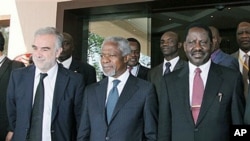Part 2 of 5-part series: Kenya: The Pace of Reforms
See Parts 1 / 2 / 3 / 4 / 5
February 28, 2008, Kofi Annan stood before thousands of Kenyans in Nairobi to announce an end to the chaos which brought the country to the brink of civil war.
“I am pleased to be able to tell you and all the citizens of Kenya that the two parties this afternoon completed the work on Agenda Item 3: How to overcome the political crisis," Annan said.
The agreement was the culmination of nearly two months of bitter negotiations between election rivals President Mwai Kibaki and current Prime Minister Raila Odinga.
Alleged irregularities in the December presidential poll prompted protests from Odinga and nationwide rallies, which eventually spiraled into bloody ethnic clashes. The chaos left over 1,300 dead and displaced more than 300,000 others.
In order to curb the nationwide bloodletting, Annan convened a series of meetings between President Kibaki and Odinga which would become known as the Kenyan National Dialogue and Reconciliation.
Limited progress
But as the anniversary of that agreement approaches, it is clear that much work remains to be done.
The pillars of the agreement revolved around four Agenda Items: ending the violence, addressing the humanitarian crisis and promoting reconciliation, resolving the political crisis and undertaking long-term reform.
The passage of Kenya’s new constitution has been widely acclaimed as the country’s achievement in the reform and reconciliation process. But as Annan warned during a recent trip to Nairobi, it is only the first step in a long journey.
“Agreement on the constitution was an essential first step to put this country on the road to the new future that Kenyans so desperately seek," he said. "But it is not enough. It is of course not enough on its own. The constitution is the beginning, not the end. The challenge now lies in its implementation.”
But other provisions of the Annan-brokered agreement have hindered that process. The resolution of the political crisis produced a power-sharing agreement and forged a coalition government between Kibaki’s Party of National Unity and Odinga’s Orange Democratic Movement.
Political wrangling
In the years since the chaos, however, political wrangling between the two sides has slowed the pace of reforms and Annan has been forced to intervene on more than one occasion.
Most recently, the coalition was engulfed in controversy surrounding President Kibaki’s unilateral appointments in Kenya’s judiciary. The appointments, including chief justice and attorney general, were immediately rejected by the Prime Minister. After a month-long standoff, the president backed down, to the displeasure of key allies such as Finance Minister Uhuru Kenyatta.
“Are we now saying the country will not move forward until Raila says so," asked Kenyatta.
The splits within Kenya’s government have also crept into the peace agreement’s first provision. While the power-sharing deal ended the country-wide chaos, recent estimates have found that as many 19,000 Kenyans are still waiting to be resettled nearly three years after the election unrest. And Kenya has yet to try any suspects for the various crimes committed during the violence.
Ethics scandal
In 2009, a Truth, Justice and Reconciliation Commission was formed to address the acts of violence but an ethics scandal surrounding its chairmen has halted the group’s work.
The task of trying the architects of the chaos fell to the International Criminal Court and its prosecutor: Luis Moreno-Ocampo. Ocampo was initially viewed by many in Kenya as its last hope for justice. But in December, the prosecutor issued a list of six suspects, including prominent politicians such as Uhuru Kenyatta and former Higher Education Minister William Ruto.
The naming of the so-called Ocampo Six stirred a backlash in Kenya with many politicians, including Energy Minister Kiraitu Murungi, denouncing the prosecutor and the court.
“The ICC is a colonial imperialist court," said Murungi. "It is only Africans from former colonies who are appearing to be tried at the ICC.”
Kenya’s government has since launched a diplomatic campaign to withdraw from the ICC, and the African Union recently approved the country’s request to appeal to the U.N. Security Council to suspend Kenya’s case. Government leaders such as Vice President Kalonzo Musyoka have argued that Kenya’s revamped judiciary should handle the chaos. But no tangible progress towards such a process has so far been made.
Successes
Despite these setbacks Kenya has also experienced relative success with certain aspects of its reform. The newly appointed anti-corruption chief Patrick Lumumba has revamped the country’s Anti-Corruption Commission, issuing cases against prominent politicians, including Ruto and Kenyatta and reopening investigations into notorious scandals such as the Anglo-Leasing Affair.
And the newly constituted Interim Independent Electoral Commission was widely praised for its administration of the constitutional referendum in August of 2010.
In December, Annan urged both the president and prime minister to continue with these successes and fulfill the promises made in the reconciliation agreements three years ago.
“The national accord committed Kenya to an ambitious reform program to secure lasting peace, stability and justice through rule of law and respect for human rights," said Annan. "These goals are as important to Kenya’s future and to its citizens as they were two years ago.”
As Kenya’s coalition government continues to find its footing, the world will likely look to the country’s next presidential poll in 2012 for evidence of true reconciliation.




